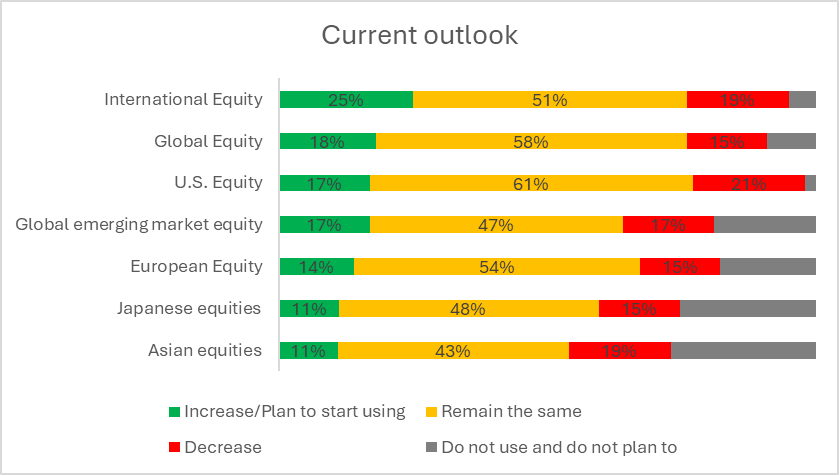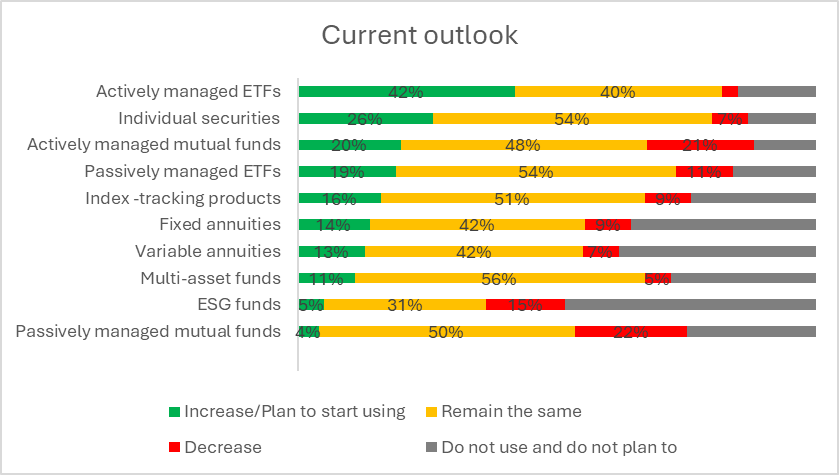

When it comes to the economy and stock market over the coming year, financial advisors are a bullish bunch – and they say they are favoring actively managed funds to help maximize the opportunities.
Nearly two-thirds in a group of 116 advisors InvestmentNews surveyed in September said they expect the S&P 500 to be at least slightly higher in 12 months, and another 14 percent said it will likely be about the same as it is today. Only about one in five said they expect the index to dip.
Over half said they expect the performance of the US economy to improve, while about 28 percent said it will likely be about the same as it is currently. And roughly 21 percent said they think it will decline.

Of course, there are some very understandable jitters they indicated they have ahead of the election. Over a third said they are very or extremely concerned about political and regulatory developments negatively affecting their businesses, followed by just about half who said they are either moderately or slightly concerned. Only 5 percent said they are not concerned at all.
Stocks and bonds
Despite the sunny attitude about the economy and S&P 500, more advisors said they planned to reduce allocations to US equity than those who expect to increase them (21 percent versus 17 percent). All others said they would maintain their allocations to the category.
When it came to international and global equity, though, slightly more advisors showed a preference for bumping up exposure in those areas.
“We’re on board with the move toward international equities,” said Sean Beznicki, director of investments at VLP Financial Advisors, in an email. “It’s a smart way to hedge against US bias, especially with the dollar showing signs of losing some strength. Adding global exposure can really help balance portfolios and reduce domestic risks.”
Opinions were much different when it came to debt, with 35 percent saying they would increase allocations to US fixed income, and 11 percent saying they would pull back. More of them also said they would hike their use of high-yield bonds (22 percent) than would cut down (15 percent).
Further, less than half of advisors said they use private equity, but nearly one in five said they would either start using it or increase their exposure over 12 months. Just 2 percent are planning to reduce private equity.
The future is active
The vehicles they’re planning to use show a potentially massive boost for what has become the hottest area of product development in the fund industry – active ETFs. Forty-two percent said they’d increase their use of actively managed ETFs or start if they did not already use them, followed by 40 percent who plan to keep their use consistent. Only 3 percent said they’d decrease their use, and 15 percent said they don’t use them at all and don’t plan to.

“They’ve been gaining traction because they give you the benefits of both worlds – diversified exposure with a manager’s insights, but without the tax headaches that come with mutual fund distributions,” Beznicki said. “It’s a really efficient way to stay nimble and proactive.”
Over a quarter of advisors also said they’d increase their use of individual securities, versus 7 percent who said they’d take money out of them.
There was also a slight preference overall for increasing use of passive ETFs, and demand for actively managed mutual funds appears largely unchanged.
But two categories stand to take a hit when it comes to advisor dollars: passive mutual funds and “ESG” funds. While only about half of advisors said they use funds that emphasize environmental, social, and governance criteria, 15 percent are pulling money from them, and only 5 percent are putting money in. Meanwhile, 22 percent expect to reduce allocations to passive mutual funds, and only 4 percent are increasing them.
Some of those preferences align with larger trends in the fund world, with a big exception being active mutual funds, which for years have been hammered by net outflows.
Active mutual funds represent more than $13.9 trillion, versus less than $6.7 trillion in passive mutual funds, $9.2 trillion in passive ETFs, and a comparably small $773 billion in active ETFs, data from Morningstar Direct show. And active mutual funds have been hemorrhaging assets, with tens of billions in net redemptions every month through September this year, totaling more than $303 billion leaving the category. Passive mutual funds have only seen money going out during July, August, and September, and total net inflows this year have been over $44 billion, the Morningstar data show. ETF sales have been reliably positive, with over $490 billion going into passive ones and more than $193 billion into active.

Relationships are key to our business but advisors are often slow to engage in specific activities designed to foster them.

Whichever path you go down, act now while you're still in control.

Pro-bitcoin professionals, however, say the cryptocurrency has ushered in change.

“LPL has evolved significantly over the last decade and still wants to scale up,” says one industry executive.

Survey findings from the Nationwide Retirement Institute offers pearls of planning wisdom from 60- to 65-year-olds, as well as insights into concerns.
Streamline your outreach with Aidentified's AI-driven solutions
This season’s market volatility: Positioning for rate relief, income growth and the AI rebound
